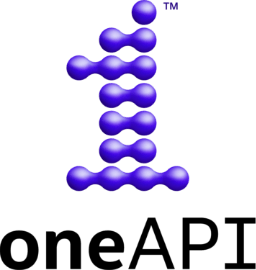Implementing oneAPI in Healthcare Technology
From Diagnostic Imaging to COVID Research, Medical Advancements Benefit from a Heterogeneous Computing Model
In healthcare as in other industry segments, momentum is growing with increasing use of the oneAPIprogramming model for lifesaving breakthroughs in Artificial Intelligence, Visual Computing, HPC and other segments.
For those unfamiliar, oneAPI is an open, unified and cross-architecture programming model for CPUs and accelerator architectures. Standards-based oneAPI simplifies software development, enables legacy code integration, and delivers uncompromised performance for accelerated compute without proprietary lock-in. With oneAPI, developers can choose the best architecture for their solution without rewriting software for the next architecture and platform.
 oneAPI is gaining momentum in the segments of the healthcare industry.
oneAPI is gaining momentum in the segments of the healthcare industry.
The importance of oneAPI in healthcare implementations lies in the processing systems commonly used by medical imaging devices, which compute and output 2D and 3D images in an array of formats. According to one market report, the global medical imaging market size is anticipated to reach $28.6 billion by 2028 – a growth trajectory driven in part by advances in medical imaging hardware and software. A new generation of GPUs for medical data processing has led to a diverse range of image processing systems – the heterogenous computing challenge oneAPI is meant to overcome. By accommodating these different systems, medical IT developers are able to focus on optimizing performance across systems without expending resources on multiple code bases for different devices.
In addition to accommodating multiple code bases, oneAPI offers the advantage of helping organizations avoid getting locked into a single proprietary solution. With this open source model, developers can utilize new hardware — based on a different architecture — without having to create an entirely new code base. This can lower development costs, extending hardware value and preventing costly delays.
Advancing the Language of Innovation
DPC++ is the primary language for oneAPI, based on C++ and SYCL standards. When used in conjunction with API-based program libraries, it allows for code reuse across CPUs, GPUs and FPGAs. DPC++ in healthcare implementations is the focus of Aleksandar Ilic, Assistant Professor and a Senior Researcher in Lisbon, Portugal, with a special interest in high-performance and energy-efficient computing and modeling of parallel heterogenous systems.

In addition, he continued, his team optimized its epistasis codes by following established guidelines, achieving speed-ups of 20X and 60X on six-core Intel® CPUs and generation 9.5 Intel GPUs, respectively. With oneAPI tools porting codes and obtaining speed-ups requires almost no effort.
Programming to Battle the Pandemic
In another example of oneAPI applied to healthcare implementations, Intel Innovator Ho Leung Ng is working to develop and apply computational methods to rapidly identify potential drug candidates for treatment of COVID-19. Ng, an Associate Professor of Biochemistry and Molecular Biophysics at Kansas State University, is leveraging a host of technology resources, including the Intel oneAPI Math Kernel Library.

To respond meaningfully to a global emergency, it was important for Ng to accelerate discovery of effective new drug treatments. His approach focused on investigating clinically used, well-studied experimental drugs that demonstrated a high potential for efficacy without toxicity or side effects. For that reason, his team employed new machine learning strategies that would help generate and evaluate promising drug candidate models.
oneAPI ‘Software First’ Strategy
From supporting Innovators like Ng to providing leadership for expanding adoption of the oneAPI specification, Intel and other leaders in heterogenous computing are committed to supporting the role of AI in transforming healthcare, providing an open, unified programming experience in which developers use their architecture of choice while maintaining optimum performance.
To assist in promoting the oneAPI industry initiative with an open specification, Intel has published its reference implementation of oneAPI. Intel collaborates with members of the software ecosystem to support common frameworks, libraries and tools for rapid, simplified AI application development on Intel® architecture. In addition, a wealth of free oneAPI developer resources are available, encompassing compilers, programming tools and performance libraries, as well as add-on toolkits for specialized workloads.

Get Involved and Review the oneAPI Specification
Learn about the latest oneAPI updates, industry initiative and news. Check out our videos and podcasts. Visit our GitHub repo – review the spec and give feedback or join the conversation happening now on our Discord channel. Then get inspired, network with peers and participate in oneAPI events.


